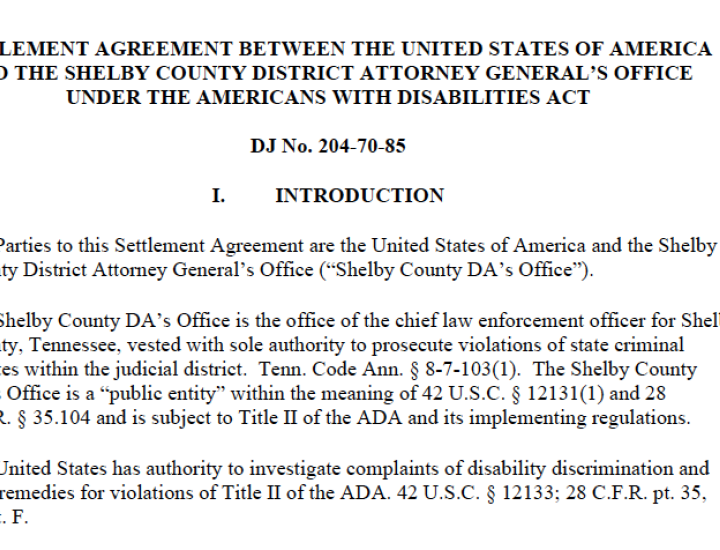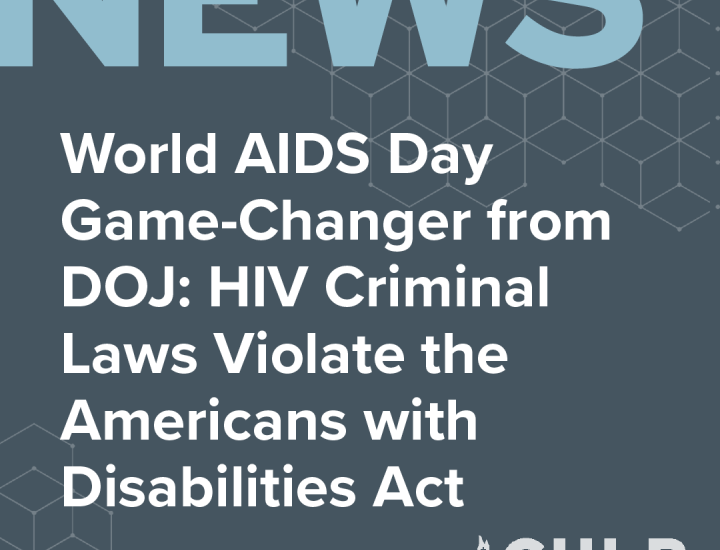News Release: CHLP Applauds Historic Agreement Between DOJ and Shelby County to Cease Enforcing Law that Discriminates Against People Living with HIV

CHLP Applauds Historic Agreement Between DOJ and Shelby County to Cease Enforcing Law that Discriminates Against People Living with HIV
As a result of CHLP complaints, sex workers living with HIV in Shelby County, Tennessee, will no longer be singled out for harsher punishments under the aggravated prostitution statute
(NEW YORK) – Yesterday the U.S. Department of Justice (DOJ) announced that it reached an agreement with the Shelby County, Tennessee, District Attorney General’s Office under which the county will stop prosecuting people living with HIV (PLHIV) using Tennessee’s aggravated prostitution law.
This unprecedented settlement marks the first time the DOJ has entered into an agreement with a public entity regarding its enforcement of criminal laws targeting PLHIV and is a historic milestone in the fight to end the criminalization of sex workers and all people living with HIV. It is also the first time the Americans with Disabilities Act (ADA) has been used to successfully counter HIV criminalization laws.
“This comprehensive agreement not only frees sex workers in Shelby County from HIV-related discrimination and prosecution but is a warning to Tennessee and other states that singling out people living with HIV for harsher punishments violates the ADA and must be stopped,” said S. Mandisa Moore-O’Neal, Executive Director of CHLP.
CHLP filed complaints with the DOJ in January of 2022 on behalf of PLHIV who have been prosecuted or are at risk of prosecution under criminal laws in Ohio and Tennessee. The complaints alleged that these laws violate the ADA by imposing harsher penalties solely based on HIV status.
In response to the CHLP complaints, the DOJ issued a findings letter last December concluding that the State of Tennessee and Shelby County’s enforcement of its aggravated prostitution offense and sex offender registration (SOR) requirement violate the ADA. The aggravated prostitution offense imposes felony punishment for conduct by PLHIV that would otherwise be a misdemeanor for people not living with HIV.
Shelby County has played an outsized role in prosecuting people living with HIV in Tennessee, where sex workers were convicted of HIV crimes far more aggressively compared to similar counties. These convictions were predominantly Black cis- and transgender women, a fact which speaks directly to the racial and gendered legacy of HIV and sex worker criminalization.
In addition to ceasing prosecutions for violations of the aggravated prostitution statute, under the terms of the agreement, Shelby County DA’s Office:
- is prohibited from prosecuting individuals for violations of sex offender registration or probation requirements that resulted from an aggravated prostitution conviction.
- must take steps to remedy other consequences of an aggravated prostitution conviction, including notifying individuals of their eligibility for vacation of sentence, termination of supervision, and elimination of costs, fees, or fines. The agreement also prohibits the opposition of any petition filed by people who have been convicted.
- is required to amend their policies, practices, and procedures to reflect the provisions of the agreement, this includes training prosecuting attorneys on these policies, practices, and procedures, as well as “the requirements of Title II of the ADA as they pertain to disability discrimination based on HIV status, HIV and its transmission, and medications used to treat HIV.”
- must submit to reporting requirements disclosing information on training, and report any prosecution “where an individual’s HIV status is relevant to the prosecution, including for any sentencing enhancements.”
- must “cease seeking any other enhanced criminal charges or penalties on the basis of a defendant’s HIV status” without conducting an individualized assessment of risk of transmission.
The agreement emphasizes the DOJ’s commitment to ending this form of discrimination against PLHIV and does not affect the DOJ’s ongoing lawsuit against the State of Tennessee and the Tennessee Bureau of Administration (TBI) for their maintenance and administration of the aggravated prostitution statute and SOR requirement.
Although it resolves violations of the ADA caused by the enforcement of the aggravated prostitution statute in Shelby County, enforcement of the aggravated prostitution offense is still possible in other Tennessee counties. While legislation in Tennessee recently removed aggravated prostitution as a “violent sex offense” requiring registration on the SOR, it did not repeal the underlying aggravated prostitution offense. It also restricted expungement relief to people who can prove their “convictions to be expunged resulted from [their] status as a victim of human trafficking.”
Despite these limitations, the agreement represents significant progress for PLHIV – especially Black transgender and cisgender women engaging in sex work in Shelby County – and provides a promising framework for ending HIV criminalization in other settings.
###


